A Brief History of the Chinese Youth Feminist Movement (Part 2012-2013)
Foreword: The Birth of Chinese Youth Feminist Activists
Since 2012, a group of young feminist activists has sprung up in Chinese society, known as the "Youth Feminist Activists". Most of them used to be students in ordinary colleges and universities, and they often used performance art to openly express their demands for gender equality in public; they will actively participate in current hot issues, are good at attracting the attention of the media, and actively hold government agencies and enterprises accountable , to educate and connect the public to promote some gender equality agendas, and to strive for equal social resources and civil rights for women.
The opportunity for the birth of Chinese young feminist activists may be traced back to 1995 - at the Fourth World Conference on Women held in Beijing, Chinese feminists who were in the early stages of enlightenment heard and witnessed feminists from all over the world They were deeply inspired by their thoughts, issues of concern, actions taken, and slogans they put forward. This rare educational opportunity opened the eyes of the earliest feminists, strengthened their confidence, and strengthened their pursuit.
Prior to this, since the reform and opening up, most of the sporadic feminists in China were within the system. Some of them were cadres of the Women’s Federation, or scholars who carried out women’s studies or gender studies courses in colleges and universities. and other activities introduced some western feminist theories to China. The World Women's Conference in 1995 gave birth to the first wave of prosperity of Chinese non-governmental women's organizations. Feminists represented by Lu Pin began to go out of the scope of the system, brought feminism to society, and actively participated in social events. It will produce a wide range of social effects, which is a qualitative change.
The rise of youth feminist activists is inseparable from the guidance, training and support of senior feminists represented by Lu Pin. In 1995, Lu Pin, who worked in Beijing's "China Women's News", participated in the report of the Fourth World Conference on Women; in 1996, Lu Pin and his friends established the "Women's Media Monitoring Network", focusing on media and gender; in 2004 Lu Pin resigned from the newspaper and became a freelancer; in 2009, under her "Women's Media Monitoring Network", she founded the "Voice of Women" e-newsletter, and in 2011 changed its name to "Voice of Women's Rights" on Sina Weibo, positioning it as a "feminist position". , civic horizon, action orientation". Until March 9, 2018, "Voice of Women's Rights" was banned from the entire Internet, it was the most influential platform for dissemination and advocacy of women's rights in China, providing important support and guidance for Chinese civil feminist activities.
In addition, according to the article "Don't Stigmatize "Feminist Activists": They Represent the Direction of Chinese Women's Rights" published by Zhang Hongping on The Paper in 2015, Lu Pin and some NGO workers initiated the campaign in July 2011. The civic activity center "Yuan Commune" is dedicated to civil society ideological enlightenment and social mobilization, and has held various feminist activities, which are open to everyone and have had a wide range of social impacts.
Many young people (mostly women, mainly female college students) were enlightened and changed in various feminist activities held by the "One Yuan Commune". This is the beginning of the "Youth Feminist Action Group" entering feminism. Circa 2011. They are all young people who have just graduated from university. They are deeply at a loss for their own future and the current Chinese society. They have heard and seen the discrimination, injustice and harm against women in society, but they don’t know how to protest. It is feminism that makes them firm. , self-confident and finding the weapons to rise up and fight back, adopting a zero-tolerance attitude, and determined to let sexism and harm end in their generation, this is what makes their generation different from the previous generation and the previous generation of women. They live in a more open and tolerant era, with fewer constraints and faster steps; they live in the Internet age, with a larger living space, and they don't have to enter the system; they understand more ideas and lifestyles, and their ideas are newer. They can choose whichever freer way of life they want to live.
In 2012, the Youth Feminist Activists began to be active in public spaces. Luo Siling also mentioned this history in "Fighting the "Straight Male Cancer Reign": Chinese Feminism in New York" :
Since 2012, she (Lu Pin) has provided support to a group of young feminists active in Beijing, Guangzhou and other cities in China. Public events such as Occupy the Men's Restroom, The Wounded Bride, and Bald Protest against Educational Inequality have brought feminist claims to unprecedented attention.
The activities initiated by the Youth Feminist Activists are quite different from the previous feminist practice in the system, showing distinct characteristics of a civil movement, but their spiritual core is commensurate with each other. Li Sipan commented on this:
The previous wave of feminist movements paid more attention to cooperation with the state, but this wave of feminist movements pays more attention to the accountability of the state, and its relationship with the state is different. On the other hand, their relationship with the public is also different. The previous wave of feminists hoped to pass the National People's Congress bill, legislation, etc., to use the words of the senior teachers, to change the concept of leading cadres first. But the latter wave of feminism was closer to the masses, and they were very active in mobilizing the media.
However, when tracing the source of youth feminist activism, it is not difficult to find that the two waves of feminist movements in China are inseparable as long as we briefly review the inheritance of Chinese feminism.
In the later wave of feminist movements, the teachers of these young people were actually participants in the previous wave of feminist movements. Many universities now have gender or feminist disciplines. The resources that these college students can access, including translated works and courses that can be established, are all the results of the previous wave of feminists. Therefore, it is the previous wave of feminism that provided the ideological weapon, including the introduction of foreign feminist movements, including the introduction of foreign resources for feminism, such as the introduction of funds from some foreign foundations. Of particular importance, I think, is the establishment of women's and gender studies disciplines in higher education so that this generation of girls can grow up in a university environment that at least includes gender and feminist disciplines.
When the young feminist activists intervened in social issues in a rather "eye-catching" way and caused public controversy, Zhang Hongping praised the young feminist activists for their commitment and brave actions, and affirmed their status as a new generation of feminists:
Engaging in a public welfare work is not an easy task. Spending all your time and energy on serving others and the society, rather than making money for yourself to buy a house, buy a car, and live an affluent life, requires the support of a belief. Not everyone can do it without hesitation. They have to take risks and sacrifices. In the end, they may not be known, and it is more likely that they will be old and have nothing to support. Therefore, we should respect, protect and tolerate them.
Now they have become the backbone of feminism, the most visible part of feminism, and represent the direction of feminism. All the feminists who agree with them stand around and behind them. They are the spirit of the previous generation of feminists They have become the relays of feminism in the new era.
It is a pity that the youth feminist activists' activities in China were once in full swing, but they were repeatedly suppressed by the authorities. When the domestic social and public opinion environment tightened rapidly around 2014, the activity of activists dropped significantly. Especially after the feminist Five Sisters incident in 2015, young feminist activists almost completely lost their space for activities on the streets, and domestic feminist activities began to shift more to social media. Since Lu Pin stayed in the United States in 2015 and has been studying and living in the United States, more Chinese feminist activities have been organized and carried out overseas to continue to maintain and cultivate new forces of Chinese feminism.
But young feminist activists should not be forgotten by the public, especially in the environment where the censorship mechanism has intensified in the past two years, civil society has almost collapsed, and it is extremely difficult for the people to speak out. However, feminism has been severely depoliticized, and feminists generally suffer from marginalization and stigmatization, and their voices are constantly disappearing in the banning and silence. Therefore, it is particularly important to reorganize and reproduce the deeds of young feminist activists, and to popularize relevant knowledge of local feminist movements. Let more people see the spiritual outlook and social contributions of the new generation of feminists in China, as well as the important gender issues they promote, including but not limited to anti-sexual assault\sexual harassment, anti-gender violence, gender equality in employment and schooling, Anti-gender stigma and stereotypes, anti-speaking and public power oppression, marriage autonomy, lesbian rights, anti-body stigma, gender equality in public spaces...and help more people discover and summarize Chinese feminism from their practices The experience, changing trends, and challenges faced by sports and even citizen movements, so as to empower ongoing or upcoming social changes.
The history of the Youth Feminist Activists is an important stroke in the history of Chinese civil movements, and it will be remembered and passed on forever by us.
references:
Tencent Culture | 12 Feminist Moments in China in 2013——Annual Review of Public Actions
China's Rights in Action | China Youth Feminist Action Video Exhibition
Public Welfare Online School | 1990 - 2017 Chronology of Anti-Domestic Violence in China
Duan Media | "I am a troublemaker, not a screw": the voice of Chinese feminist activists
China Mi Rabbit Exhibition: Chronology of Anti-Sexual Harassment in China (1995-2019)
The New York Times | Confronting "Straight Male Cancer Reign": Chinese Women's Rights in New York
Fa Guang | Li Sipan: The new feminist movement pays more attention to government accountability
Li Sipan | Why Mainland Liberals Don’t Support Feminism
Lu Pin | A Brief History of Anti-feminist Rights on Weibo
A Brief History of the Chinese Youth Feminist Movement (Part 2012-2013)
2012
February 19th "Occupy Men's Restroom" movement
Young feminist activists Li Maizi , Zheng Churan and others launched the "Occupy Men's Restroom" movement for the first time at a free public toilet next to Yuexiu Park in Guangzhou. The protesters entered the men's toilet several times to clear the scene and invited women in long lines to enter the men's toilet for convenience. They also put up display boards with slogans such as "Women are more 'convenient', genders are more equal", "If you love her, don't make her wait!" and other slogans, calling for solutions to the unreasonable ratio of men's and women's toilets and women's waiting time to go to the toilet. problem, it is suggested to increase the number of women's toilets and build more gender-neutral toilets.
The event was widely reported by the media, and within a month, the "Occupy Men's Restroom" movement spread to many cities across the country.
Six months after the first "Occupy Men's Restroom" in Guangzhou, that is, on the morning of August 20, 2012, 16 girls carried homemade foam "toilets" and came to the office building of Guangzhou Urban Management Committee on Wenming Road to launch another During the protest, they put up a banner saying: "The ratio of toilets is 2:1, otherwise girls can't wait"; they also made a large display board of the open letter, and read the contents of the letter aloud at the gate of the Urban Management Committee. Subsequently, under the leadership of the staff, the initiators of the event, Ou Jiayang, Li Maizi and Zheng Churan, as representatives, entered the office of the Urban Management Committee and submitted 16 "Letters to the Urban Management Committee", urging the Urban Management Committee to put the toilet reconstruction work on the table as soon as possible. schedule.
In November 2016, according to the Guangzhou Daily, the Ministry of Housing and Urban-Rural Development of Guangzhou issued the "Design Standards for Urban Public Toilets" , which increased the ratio of female toilets to male toilets in public toilets to 3:2. Large areas are 2:1. This standard has been implemented since December 1, 2016.
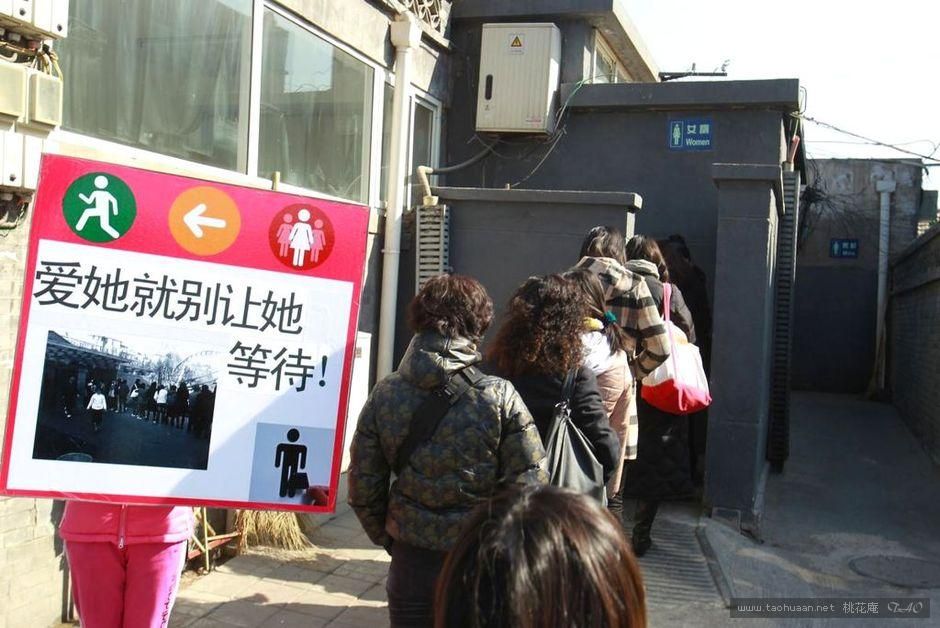
references:
Ji Xiaocheng | [Today in Feminist History] February 19th: "Occupy Men's Restroom" Action
On April 26, Zheng Churan sent a letter to the top 500 companies in the country calling for the abolition of employment gender restrictions

Zheng Churan, a feminist activist who was a senior student at Sun Yat-sen University at the time, brought 500 proposal letters to the school post office by bicycle. She sent a suggestion letter to the CEOs of the top 500 companies in the country on the removal of employment gender restrictions, calling on the companies to issue a statement on equal employment, pay attention to and solve the unfair requirements and restrictions on women when companies recruit college graduates.
In addition, Zheng Churan has also carried out a number of activities aimed at gender discrimination in employment, including inviting the head of the Human Resources and Social Security Agency to visit the market, complaining about gender discrimination in job advertisements, etc.
references:
June 24 "I can flirt, but you can't"
On June 20, 2012, the official microblog of the second Shanghai Metro Games posted a photo of the back of a girl in a see-through outfit, with the text: "It's no wonder you don't get harassed if you dress like this. Girl, please respect yourself!" This remark Immediately aroused the dissatisfaction of many netizens, especially feminists. On the 24th, Chen remembered to plan and execute a subway performance art. She and another volunteer appeared on the Shanghai Metro Line 2 to protest against sexual harassment. One of them was wrapped in a black robe, and the other wore a metal "chest" on her bunt. "I want to be cool, not a pervert" and "I can harass you but not harass you" with placards. After that, this slogan quickly became a hot word on the Internet and triggered a wide range of public discussions.

references:
Netease Women | I can flirt, but you can't
Fenghuang.com|I can harass you but you can't?
On August 9th, support Li Yang's wife Li Jin (Kim) against domestic violence
On August 31, 2011, Kim Lee, the wife of Li Yang , the founder of "Crazy English", showed photos of her injuries on Weibo, exposing Li Yang's domestic violence, and filed for divorce in October, which caused a lot of controversy. Media attention and discussion among netizens. During the third court session on August 9, 2012, several feminist activists and anti-domestic violence volunteers specially came to the gate of the court to support Li Jin before the court session, and sent scrolls with thousands of netizens signing anti-domestic violence , and entrusted Li Jin to hand over to the judge a "Joint Letter Against Domestic Violence". After the court session, they also sang an adapted version of "Can't afford to be hurt" at the gate of the court, calling for a fair judgment by the court.
On February 3, 2013, the first instance of the Li Jin v. Li Yang case was pronounced in the Chaoyang Court in Beijing. Li Jin was granted custody of his three daughters, and was awarded 12 million yuan in property exchange and 50,000 yuan in compensation for mental damage. This is the highest amount of divorce and domestic violence compensation awarded by a Chinese court so far. Li Jin also received the first public domestic violence civil protection order in Beijing.
Li Yang's domestic violence case is regarded as a milestone event in China's anti-domestic violence , and it is also the starting point for young feminist activists to start a series of anti-domestic violence legislation.

references:
Netease Woman | Li Yang's divorce case reopens again, volunteers send autographs to support Kim
Xinhua | "Crazy English" Li Yang's divorce case may urge more women to say no to domestic violence
August 30 Shaving heads against gender inequality in college admissions
In early July 2012, after the college entrance examination score line was announced, the media found that many colleges and universities had a gender-based scoring line, and the gap between male and female scores was as high as 40 points. It has aroused widespread concern and dissatisfaction in the society. More than 20 lawyers from different provinces issued a joint statement, announcing that they will provide voluntary legal aid to female candidates who lost their equal education opportunities due to their gender in the college entrance examination, and assist them in anti-gender discrimination lawsuits.
Feminist activist Lu Pin and public interest lawyer Huang Yizhi applied to the Ministry of Education for information disclosure, asking which majors the Ministry of Education approves can limit the ratio of male and female students. The Ministry of Education responded that it was "based on national interests."
Therefore, on August 23, four feminist activists, Xiao Meili , Liang Xiaomen, Li Maizi, and Ouyang Le, used a performance art of shaving their heads under the Wenta in Guangzhou to express their concern over the issue of dividing lines between male and female students in advance. concerns, and collectively sent a letter to the Ministry of Education, calling for an early solution to the problem of gender discrimination in high-ranking recruits. They shaved off their hair, a symbol of femininity, to express their dissatisfaction with the Ministry of Education's response. They believed that the Ministry of Education's response was "zero", and hoped that the Ministry of Education could further "show" which special majors must increase the admission standards for girls and the basis.
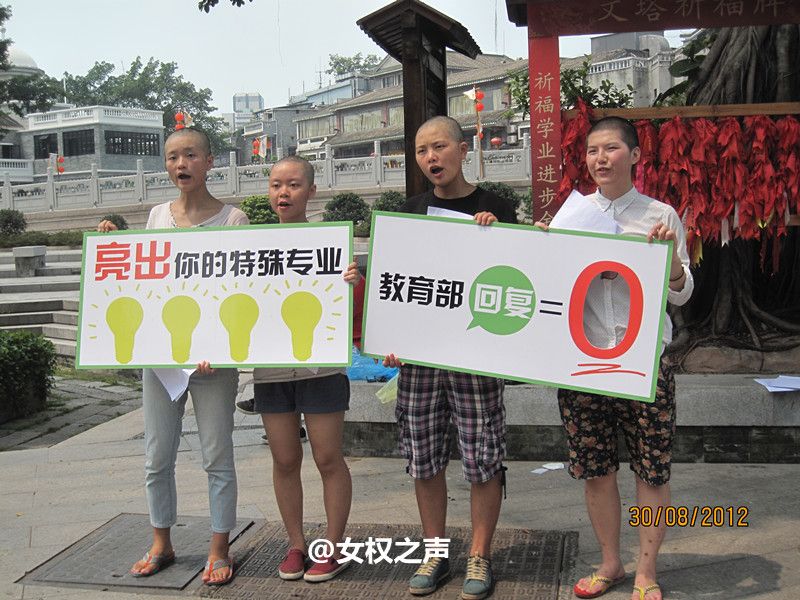
references:
September 16 "Don't be a vase, just be yourself"

In order to protest the beauty pageant for college students on campus, feminist activists chanted the slogan "Don't be a vase, just be yourself" in front of a university in Wuchang, and smashed a 1.2-meter-high vase, which was covered with A series of labels for judging "beauty" such as "oval face", "big eyes", "high nose bridge", "tight chest", "water snake waist". Ye Ye, one of the initiators of the action, said that beauty pageants for college students on campus are not only detrimental to the development of women's diverse personalities, but may also cause appearance discrimination in the future career selection process for female college students.
references:
NTD | Refusal to be a vase, Hubei female college student smashes a vase and opposes a beauty pageant
November Nude photos call for anti-domestic violence legislation
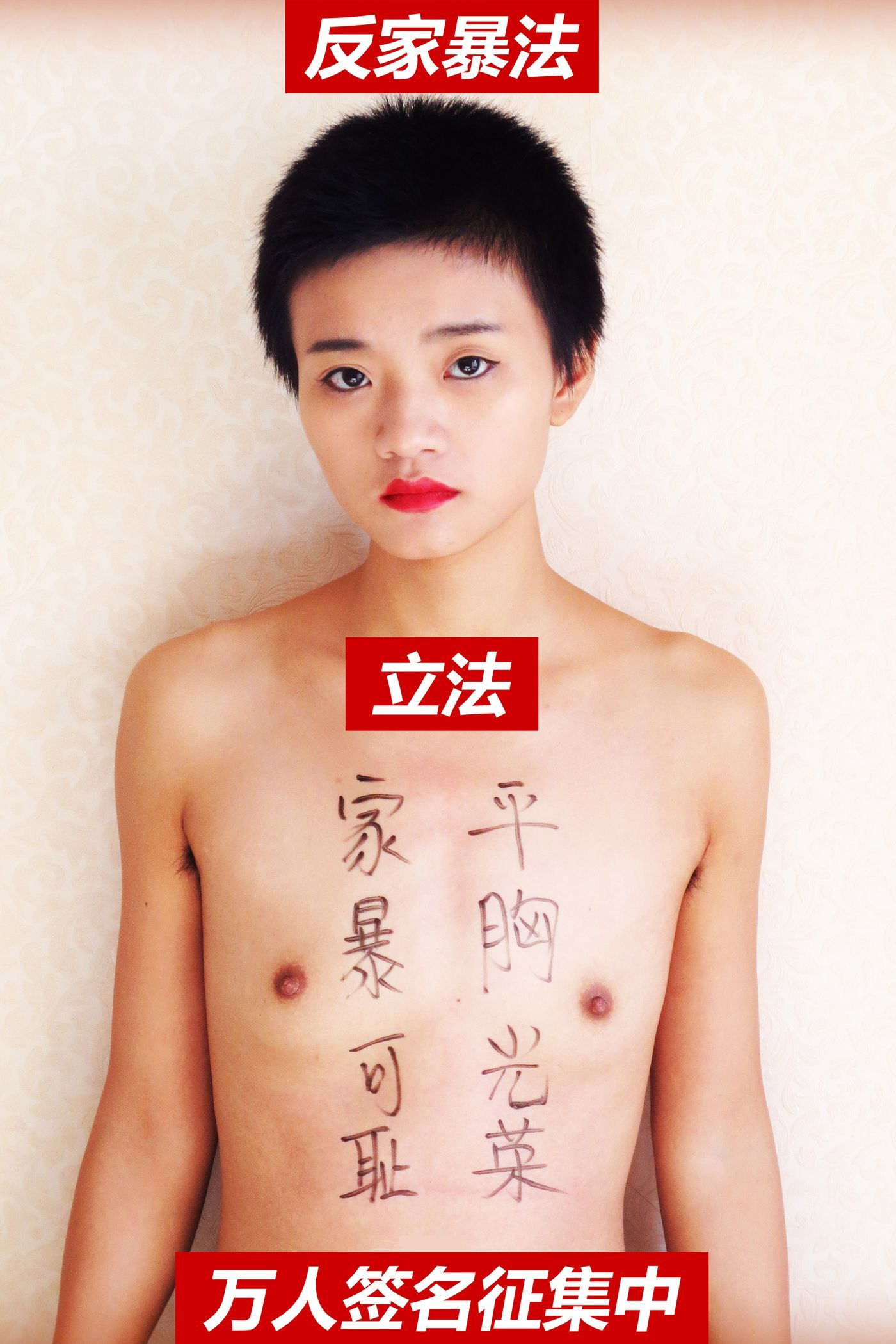
On November 7th, a number of feminist and public welfare organizations jointly launched the "Ten Thousands Urge Anti-Domestic Violence Legislation to Sign" campaign on various online channels. In order to continue to promote the activity and attract more signatures, feminist activists led by Xiao Meili Posted a semi-nude photo on Weibo to encourage more people to join the joint signature. In front of an all-white background, newly shaved short hair, bright red lips, calmly staring outward, with a little squinting eyes, bare On the front chest is black writing in marker pen - "domestic violence is shameful and flat chested is glorious".
After that, 15 participants successively posted nude or semi-nude photos on Sina Weibo to support the joint signature. Among these people, there are women, men and transgender people. They are in different cities, and they all responded to the voice of women's rights. Feminist Voices, who participated in organizing the event, commented that the topless anti-domestic violence campaign has brought the debate with the public to the forefront of women's body politics like never before. If it is said that breaking through taboos, creating controversy, and trying to highlight appeals in the controversy, spreading and disseminating has always been the general strategy of "feminist activists" recently. I have to say something.
references:
November 26 Protest against the need for a gynecological examination to recruit civil servants
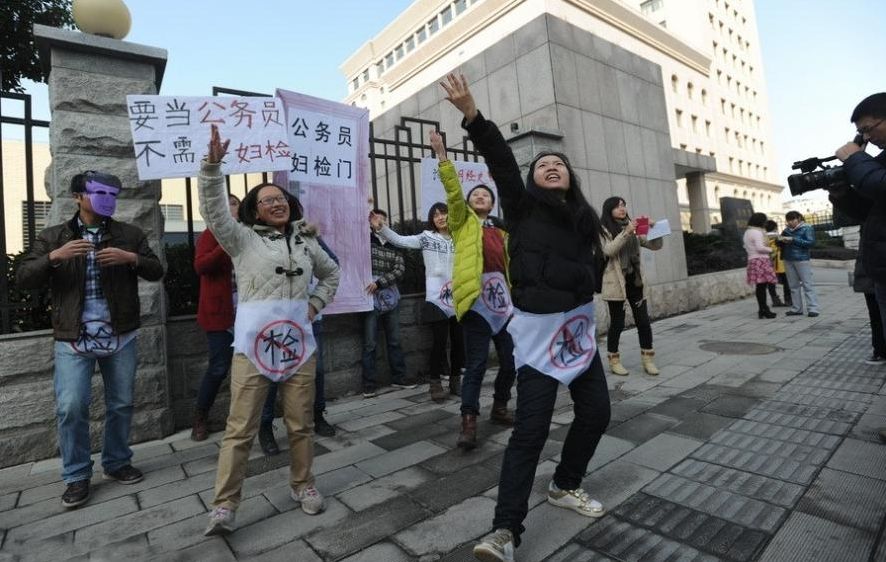
On the morning of November 26, after the annual national civil servant examination came to an end, more than 10 feminist activists in Wuhan, Hubei, protested in front of the Provincial Department of Human Resources and Social Security that women would be examined during the physical examination for civil servant recruitment. "If you want to be a civil servant, you don't need a gynecological examination" and "Ask about your menstrual history, how can you contact a civil servant?" Activists held up these slogans at the scene. Played the self-compiled song "Physical Examination Free Style".
According to the organizers of the event, the current medical examinations for female civil servants include the "Gynecological Examination". This item requires women not only to undergo a vaginal speculum test, but also to answer the age of menarche, cycle, bleeding volume, and duration. wait. "We believe that these entry-level physical examination items have nothing to do with the ability to be a civil servant, and they are suspected of infringing on the privacy of citizens. We hope that through this way of expressing appeals, we can remind relevant departments to break the gate of women's examination for civil servants."
references:
Caijing.com | College students protest civil service exams
December 10 "Blooded Bride" against domestic violence
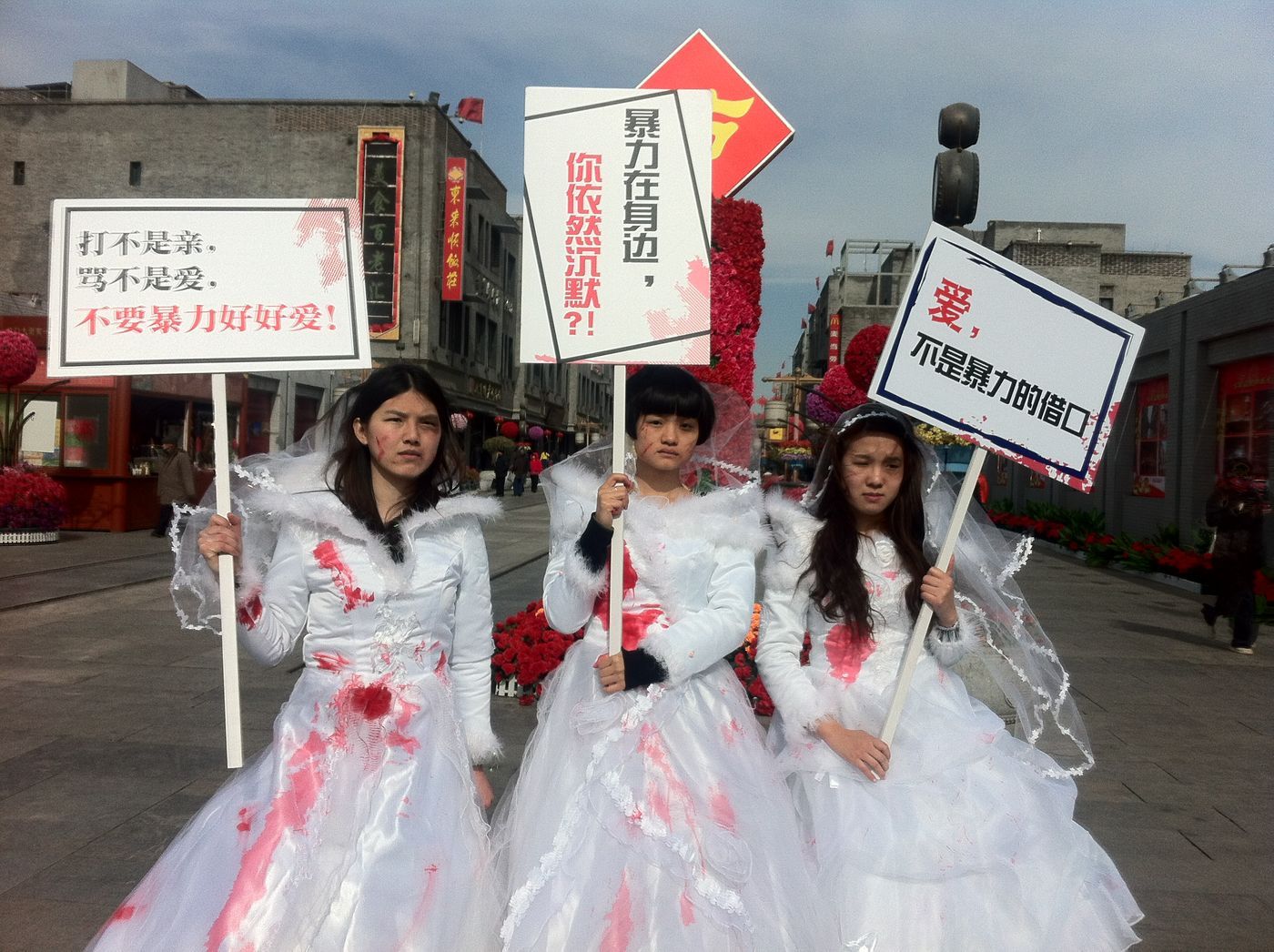
December 10, 2012 is World Human Rights Day and the final day of the 16 Days of Gender-Based Violence Campaign. In response to the movement, more than 20 feminist activists from 13 cities including Beijing and Guangzhou held a performance art demonstration called "Injured Bride" on the streets. They also applied to the public security bureaus of their respective cities for government information disclosure. Ask the local public security bureau: What have you done to solve the problem of domestic violence?
Then, on Valentine's Day, February 14, three women's rights activists, Xiao Meili, Li Maizi, and Xiong Jing, dressed as "injured brides" in blood-stained wedding dresses, appeared on Beijing's Qianmen Pedestrian Street. They held up billboards such as "Equality leads to harmony, violence does not have a special zone" and "Violence is by your side, you are still silent?!" and took photos and displayed them. They walked along Qianmen Street and shouted, "Beating is not kissing, scolding is not love, don't be violent and be good." Love" and "Love is no excuse for violence". At the same time, volunteers distributed anti-violence propaganda materials to passers-by. This is also the first street performance art activity against violence against women held on Valentine's Day in Beijing.
references:
year 2013
February 3 I don't want to be the next "Li Yan"
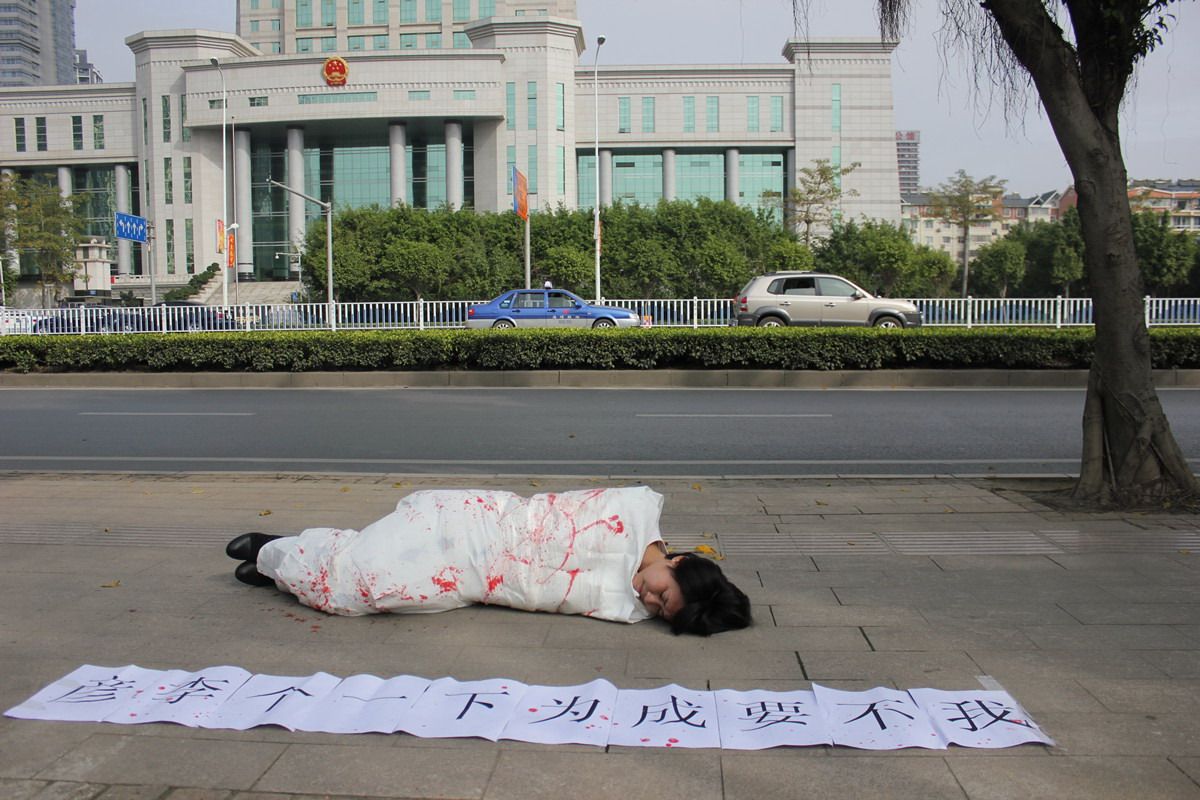
At the end of 2012, the Supreme People's Court approved Li Yan's death sentence in the case of Li Yan, a woman who suffered domestic violence, and killed her husband. Since the verdict did not recognize the fact that Li Yan suffered from domestic violence for a long time and killed because of domestic violence, after the verdict came out, more than 400 lawyers, academics, NGO organizations, and people from all walks of life appealed to Li Yan, hoping that the Supreme Court would kill him. keep people.
On February 3, 2013, at the gates of courts in cities such as Guangzhou, Shanghai, and Wuhan, feminist activists wrapped themselves in layers of white cloth to form pupae, showing that they were struggling but unable to break free. A few big words: "I don't want to be the next Li Yan", to appeal to the public's attention. Feminist activists believe that Li Yan's crime is not worthy of death, so through the "Human Chrysalis" performance art, it expresses that women are under heavy constraints, struggling hard but unable to effectively protect themselves. Hua Mu, an activist in Guangzhou, believes: "Li Yan has sought help from the Women's Federation, the police station, and the neighborhood committee many times, but the domestic violence has not been stopped. She still has to face the violence of her husband. In a society where the victims of violence cannot receive effective assistance, Li Yan is a It is worthy of sympathy. Li Yan's death penalty is a tragedy for all victims of domestic violence, and it is even more a tragedy for a society that lacks relevant laws."
references:
NetEase Women | Sichuan Li Yan was sentenced to death for domestic violence killing her husband
February 28 Protest against gender injustice in college entrance examination admissions

Wearing middle school uniforms, five activists staged a flash mob performance in front of the Guangdong Provincial Entrance Examination Committee, protesting against the discrimination against girls by satirizing the Ministry of Education's gaokao admissions scores for men and women. They yelled and sold baked sweet potatoes to passers-by with singing and exaggerated and cute dances. At the same time, they tore high school textbooks page by page, symbolizing that they would use the pages of textbooks to bake sweet potatoes, which meant burning books. There were some signs beside them that read He wrote "The Ministry of Education does not decide for me, it is better to go home and bake sweet potatoes", "In ancient times, there were books burned and Confucian scholars, but now girls go to the street to bake sweet potatoes" and "Everyone is equal before sweet potatoes".
One of the activists said: Men and women are different in marking the marks. Instead of taking the exam, it is better to sell sweet potatoes. At least selling sweet potatoes is equal, just to express this meaning. Another activist said: They wanted to use this form of street performance to express their dissatisfaction, hoping to attract more people's attention, so as to prompt the Ministry of Education to make adjustments in the new year's enrollment.
references:
March 3 Protest against the establishment of "Lady Class" in True Light Middle School

After the news that Guangzhou Zhenguang Middle School would open the city's first girls' class appeared in the newspapers, on the morning of March 3, six activists came to the gate of Zhenguang Middle School to protest. A male activist wearing a skirt and school uniform was knitting a sweater at the gate of True Light Middle School to protest the school's opening of "lady class". There were also girls holding up slogans such as "Because sex is not taught and unscientific, boys also need to be taught by ladies", and "Lady tops the yarn" to express their dissatisfaction.
Liang, the main participant in the protest, is a student of South China University of Technology. He believes that the cooking, eloquence, and etiquette courses to be offered by the "lady class" are suspected of equating these abilities with the concept of "lady", and girls wear cheongsam to school. The inconvenience caused, as well as the time and energy consumed by changing clothes before physical education class, may reduce the overall competitiveness of girls. He believes that schools should offer diversified courses based on students' personality characteristics rather than gender, and some science and engineering courses such as astronomy, physics, chemistry, and mathematics can also be considered.
references:
April 8 Protest against online stigma against women such as "green tea whore"

In 2013, due to the "Sanya Sea and Sky Feast" incident, the term "green tea whore" quickly became popular on the Internet. Netizens interpreted it as specifically referring to "those prostitutes who pretend to be innocent, women who are harmless on the surface but actually have greater ambitions than anyone else."
On the morning of April 8, 2013, near the Bell Tower in Xi'an, three activists, including Li Maizi, were wearing Sailor Moon sailor suits. One of them held a sign: "Not your green tea, nor your bitch", Another "warrior" held up a "magic wand" and pointed to the sign held by the third "warrior", which symbolized the determination to eliminate these verbal violence: oppose "green tea bitch", "black fungus" and other words that insult women.
references:
NetEase Women | The Misogyny Behind the Dirty Word "Green Tea Bitch"
China Women's Research Network | Gender Violence Behind the "Green Tea Whore"
May 16 "Homophobia Kills Lesbians"
To commemorate the "International Day Against Homophobia", activists organized a flash mob at the Yinding Bridge in Houhai, Beijing, and on Metro Line 6. Three couples of girls kissed in public, and a passing man yelled, "Die gay!" The girl They fell to the ground in shock, while the red slogan "Homophobia Kills Lesbians" covering the girls pointed out the theme of the performance. The promoter of the activity, Xiao Hang, said that she told her parents that she was gay, but she failed to win their understanding. The latter still believed that homosexuality was a terrible mental illness. She hoped that the public would know more about homosexuality and stop discriminating against homosexuality. As for "Lesbian" is specifically proposed because lesbians are more neglected by society than gay men, so the word "female" should be highlighted.

references:
Soutong.com | Young girls in Beijing "play dead" flash mob against homophobia
Deutsche Welle | "No more homophobia day", gay rights are fighting
May 27 "Open a room to find me, let the primary school students go"
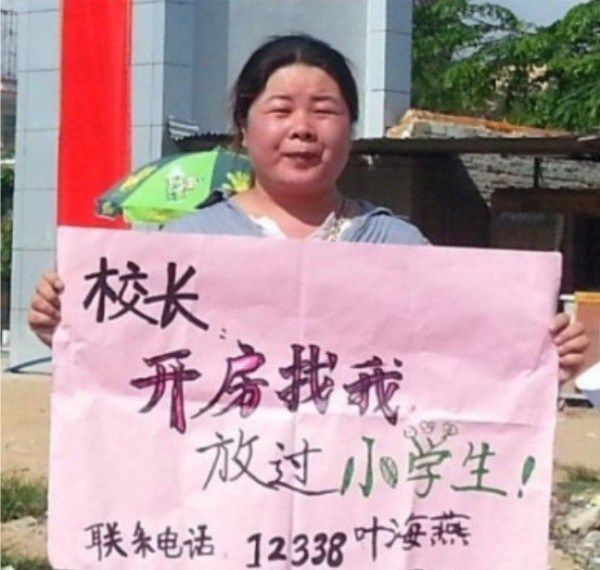
On May 8, Chen Zaipeng, the principal of Hainan Wanning Primary School, and the staff of the Housing Management Bureau brought 6 elementary school girls to open a room. Over the next 20 days or so, seven more cases of primary school teachers being suspected of molesting and sexually assaulting young girls were exposed. A series of incidents of sexually assaulting young girls have aroused widespread concern in the society, and people have condemned such heinous sexual assaults in various ways. On May 27, feminist activist Ye Haiyan (pen name "Rogue Yan") held a sign at the gate of the No. 2 Primary School in Wanning City, Hainan Province to protest against Chen Zaipeng's bad behavior. Afterwards, many netizens responded one after another. They either showed up in person to raise placards to protest, or PS pictures of Sister Feng, Voldemort, Shrek, etc. in support.
Afterwards, Ye Haiyan returned to her rented house in Bobai County, Yulin City, Guangxi, and posted on Sina Weibo that her landlord was under official pressure to move her out. Later, Ye Haiyan repeatedly posted on Weibo, saying that she was beaten by 11 people while she was at home with her daughter. However, after reporting to the police, Ye Haiyan was administratively detained by Yulin Bobai Public Security Bureau on the charge of "injuring someone with a knife". On the same day, 59-year-old female scholar Ai Xiaoming posted a semi-nude photo of "Find me in a room, let Ye Haiyan go" on Weibo in support of Ye Haiyan.
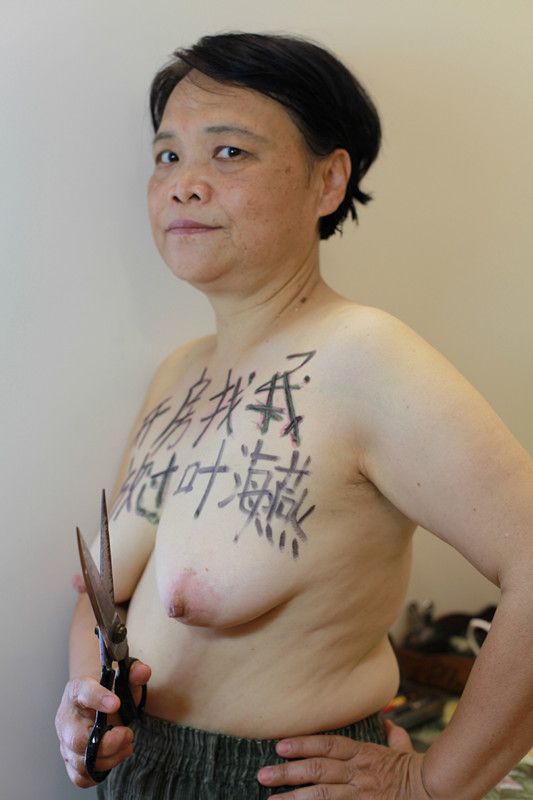
references:
BBC | Well-known female scholars take semi-nude photos to support Ye Haiyan
June 18 Protest against Meituan dismissing pregnant women

On June 18, a number of Chinese feminist activists, including Xiao Meili, Li Maizi, and Xiong Jing, held signs outside the Meituan company in protest. They dressed themselves up as pregnant women in different industries, such as chefs, doctors, and nurses, to support the female employees who were fired by Meituan because of their pregnancy. The dismissal incident has sparked heated discussions on the Internet. The person involved, Bao Yating, joined Meituan.com as a media director in May 2011. She was notified by the company to force her to terminate her labor contract when she was three months pregnant. Later, because he was dissatisfied with her requirements such as "eating on time" and "refusing to work overtime", he accused and made things difficult for her in various aspects in order to seek legitimate reasons for terminating the contract, but failed to produce reliable evidence.
Bao Yating applied for arbitration after communicating with the company to no avail, and received a notice of filing the case from the Beijing Haidian District Labor Arbitration Commission on June 13. On September 16, the Arbitration Commission announced the results, ruling that Meituan.com should continue to perform the labor contract with Bao Yating, and pay the wages owed to Bao Yating in one lump sum within 10 days from the effective date of the award.
references:
Niuhua.com | Is the Internet a cold-blooded industry behind the Meituan dismissal of pregnant women?
Beginning in September, the beautiful feminist hike
Xiao Meili, a 24-year-old feminist activist at the time, launched the "Beautiful Feminist Walk" anti-sexual assault campaign. She set off from Beijing in mid-September, passing Zhengzhou, Wuhan, Changsha and other cities along the way, and arrived at her destination in Guangzhou. It took 114 days and a total distance of more than 2,500 kilometers in each province. She played a clear feminist slogan for this walk: "Oppose sexual assault, women want freedom." During the walk, she kept submitting some advice letters and government information disclosure applications to the local education bureau, calling on the authorities to take specific measures to prevent campus sex. infringement. She sent a total of 165 proposal letters and 165 information disclosure applications, and accepted interviews, held sharing sessions, and collected signatures along the way to call for broader public participation.
Xiao Meili said that the reason for choosing hiking is that there are many stereotypes about women in Chinese society, that long-term hiking is not suitable for women, women will be raped when hiking, etc., but this is not the case, this is just everyone's perception of rape a myth. She hopes that through hiking, this stereotype can be broken. Locking up women is not the solution to the problem of sexual assault. Rather, gender equality should be made so that women will be safer and freer.
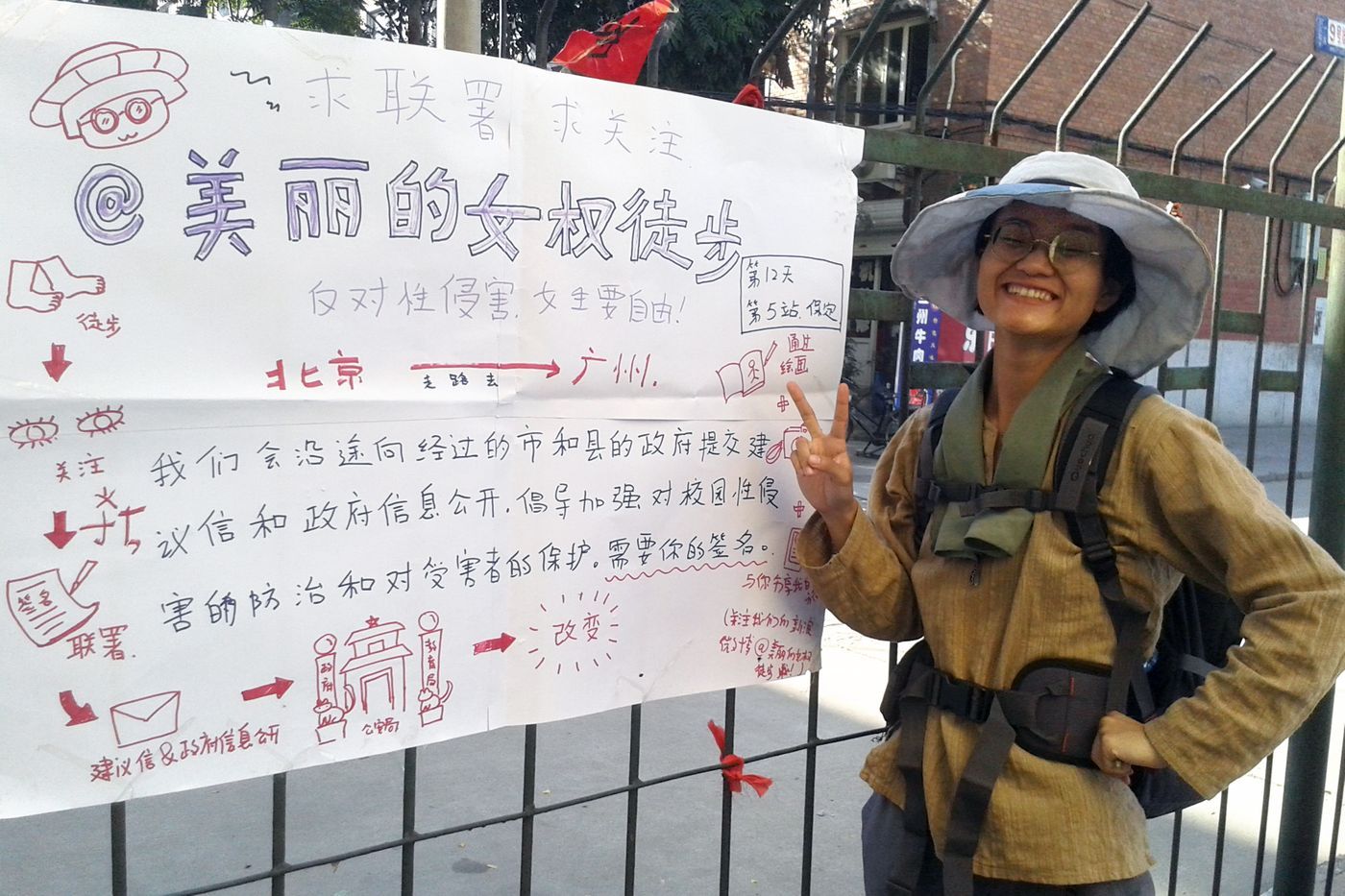

references:
Xiao Meili | Beautiful women's rights hike - against sexual assault, girls want to be free!
BBC | Feature: Chinese woman hikes to promote women's rights
NetEase Women | NetEase Women Interview with Xiao Meili: Beautiful Feminist Hiking
Holland Online | From Beijing to Guangzhou: Xiao Meili's feminist walk
October 31 "Don't take me as a sensitive word": "My Vagina Says" photo released
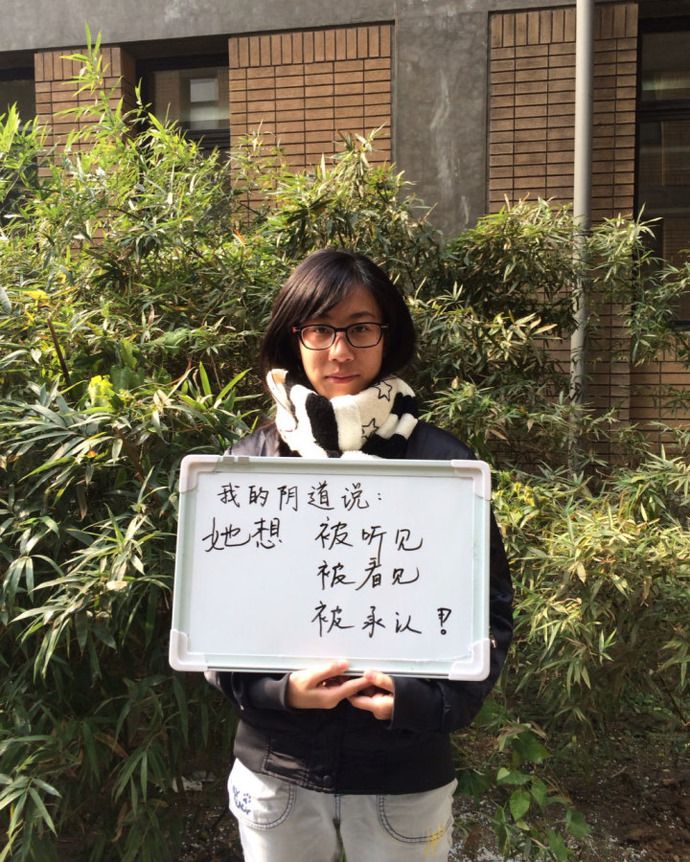
On October 31, 17 female college students from the "Gender Action Group of Beijing Foreign Studies University" released a series of real-life confession photos "My Vagina Says" on RenRen: "My Vagina Says: I Want Freedom", "My Vagina Says : I want to respect", "My vagina said: don't treat me as a sensitive word"... The purpose is to promote their upcoming play "The Way of the Vagina" to be performed in school.
The photos quickly spread on social media, followed by a lot of criticism and even abuse and insults. The posthumous title of "immoral" was overwhelming, and the girls of BFSU were under tremendous pressure. The original creators of "The Way of the Vagina", Beijing Bcome Group, Sina Weibo @女权之声, etc. responded urgently, released more photos of the same theme as solidarity, and expounded the "Vagina Theory" through media interviews, seminars, online discussions, etc. "Women's sexual autonomy and public expression rights behind it, criticize the violent culture that controls and oppresses women's sexual rights.
references:
Netease Women | What's wrong with the "My Vagina Theory" of BFSU girls?
Feminist Voice | Ai Xiaoming on "My Vagina Says
November 24th, the song of women's rights sang on the Beijing subway
More than a dozen feminist activists sang the feminist song "Do You Hear Women Singing" (adapted from the famous song "Do You Hear the People Sing" from the musical "Les Miserables") in the carriages of Beijing Subway Line 13. In society In Beijing, where the control is the strictest, they use the subway car as a public space for rights advocacy, and use the "flash mob" program to promote the "Day for the Elimination of Violence against Women" on November 25. In addition to the eight singing girls, there are two accompanying Girls are handing out lyrics and promotional materials for passengers - "Feminist ABC", "Rape Myth" and postcards against sexual harassment and gender violence.
references:
Netease Women | Listen! woman singing
November 25th is the International Day for the Elimination of Violence against Women to promote anti-domestic violence
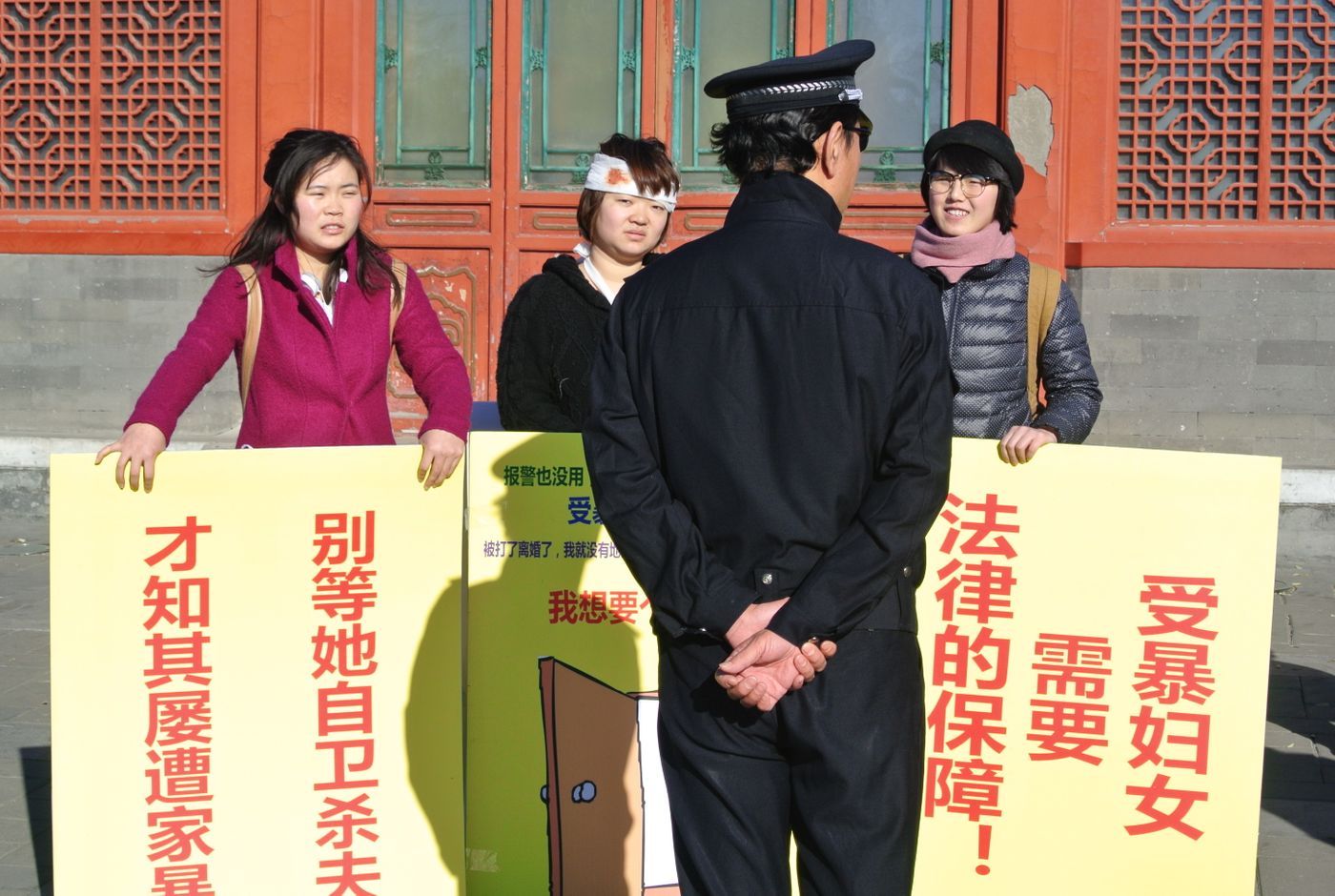
On the International Day for the Elimination of Violence against Women, four activists performed anti-domestic violence performance art on the street near the Lotus Market in Houhai, Beijing. One activist was dressed in makeup with "bloody" gauze wrapped around his head and a bandage on his arm , representing women who have been hurt by violence in their lives, standing in a small space surrounded by cardboard with the words "I want a safe home". The four together sang the theme song "Do you hear the people sing" which they adapted from "Les Miserables".
references:
December 12 Arhats piled up in front of the government gate of "Peasant Married Girls"
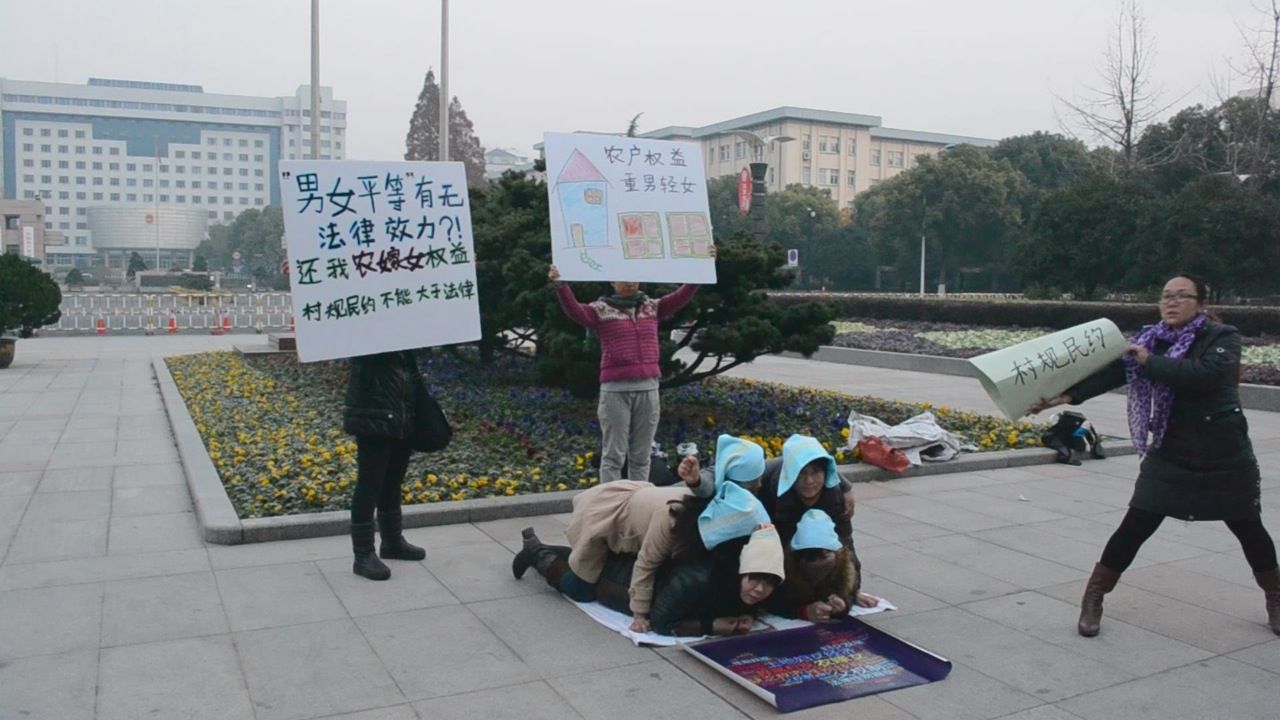
In front of the People's Government of Zhejiang Province, a group of rural women created the "Stacked Arhats" performance art to protest against the village rules and regulations that favor boys over girls and the dereliction of duty of relevant departments. Activists dressed as "village officials" shouted with a loudspeaker marked "Village Regulations and Civil Agreements": "A married daughter is like water poured out. Dividends, land distribution, house distribution, and compensation for land expropriation cannot be distributed, or The share is less than that of the men." Under the loudspeaker, the women lay down on the ground one by one, and were labeled "water thrown out by married daughters", "unequal men and women", "merged into brother's household registration", etc. and other slogans.
Land rights and collective income distribution rights are deprived, making rural married women a victim and protest group with Chinese characteristics. Some villages openly violate the express stipulation that women should have equal land rights with men through village regulations, and government departments often use " "Villager self-government" as an excuse to indulge and refuse to correct, the court did not file a case, and there was no response to the petition, and the difficulty of defending rights made many "married farmers" despair, and also prompted some of them to come forward to the government and the public more bravely. Innovative communication methods gave them hope to persevere.
references:
The New York Times | Rural women use performance art to protest unfair treatment
Followed by "A Brief History of China's Youth Feminist Movement (Part Two 2014-2019)"
Like my work? Don't forget to support and clap, let me know that you are with me on the road of creation. Keep this enthusiasm together!
